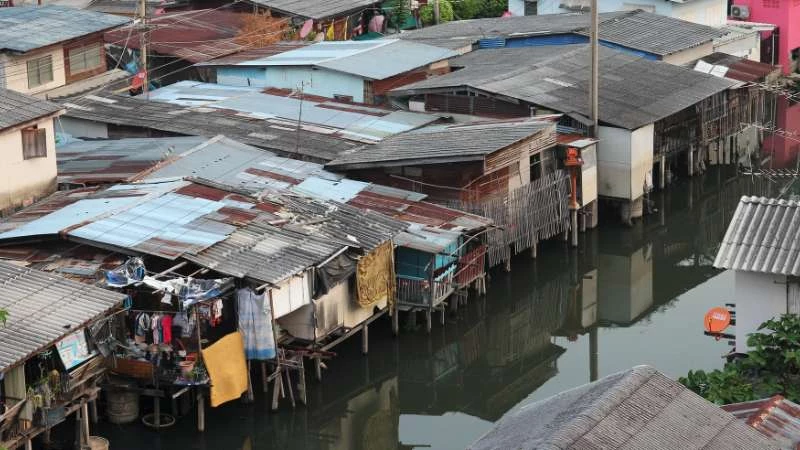As the minaret’s call fades, the noise from Bangkok’s khlong boats intensifies as they carry commuters along the waterways. Together with two Iraqi friends Nassr, a Palestinian Syrian, watches the bustle, wishing he could get a job.
“We cannot work. There are no options to make money. All we can do is wait,” says Nassr.
Four years ago, Nassr lived in the suburbs of Damascus with his wife and three teenage children, running a carpeting business. But as the war crept closer, everything changed. “Instead of smiling people there were dead bodies in the streets. It was time to leave.”
A friend from Syria, who had made it to Bangkok, advised Nassr to forget the risky route to Greece and instead obtain tourist visas for Thailand, the last country with an open consulate in Damascus.
“The simplicity of it was appealing,” Nassr recalls. “We went there, applied for visas – 100 US dollars each – bought five plane tickets and before we knew it we were in Thailand.”
Neither Nassr nor his family knew much about Thailand but his friend told him that, once in Bangkok, it would be only a few weeks before the UN resettled them somewhere safe.
“I believed this way we could reach Europe, but without the risk of losing my family at sea,” says Nassr.
Four years later, he still has no leaving date. The UN refugee agency (UNHCR) has told him he will need to wait at least another two years before he can move. The agency says asylum applications are assessed on the merits of each case, on a first come, first served basis, prioritizing those who are considered vulnerable.
While he waits, Nassr spends his days between the mosque and grocery shopping. “I try to stay inside as much as possible, try to avoid drawing attention. You never know if they will detain you.”
Nassr says he and his family rely on support from his brothers and sisters, who live overseas. Most of them left Syria before the war began.
Thailand is not a signatory to the refugee convention, so neither recognizes the status of refugees nor protects them. The number of urban asylum seekers in Thailand has tripled in the past three years, says the UNHCR.
“Once the three-month tourist visa expires, you basically become an illegal alien here,” says Jennifer Bose, of UNHCR Thailand. From that moment, refugees face the risk of detention or deportation.
For the few hundred Syrians in Thailand – exact numbers are unavailable – life in the tropics is a constant struggle. Stuck in limbo, they often hide in their rooms, unable to work or go to school.
Whenever an unfamiliar sound penetrates Firaz’s tiny one-room apartment on the outskirts of Bangkok, he freezes. The immigration police always appear unannounced, as they did two years ago when his family was arrested and taken to a detention centre. After two weeks in custody – crammed into a cell “like sheep” – and a bail payment of 140,000 Thai baht (4,000 US dollars), they were released.
“They can show up at night and we never know if they are here to tease us or arrest us,” says Firaz, 42, sitting on the floor of the room he shares with his wife, mother and two children.
Firaz is a second-generation refugee whose family originates from Palestine. When, in 2012, the war reached his home in Yarmouk Camp (a Damascus district populated by Palestinian refugees) the family fled to Lebanon. After what they describe as a hard time, they gathered the money for a one-way trip to Thailand.
Besides a monthly payment of 3,000 Thai baht from the UN – due to Firaz’s health problems – and 600 baht to support the children, the family lives on gifts.
“I stopped sending my children to Thai lessons at the His fridge contains withered carrots, brown cabbage and an out-of-date can of sardines. “This is what I feed my family. I cannot sleep. I keep on thinking, ‘How will we survive tomorrow? What will I cook them?’” With worries over food, Firaz sometimes wishes he had never come to Thailand, although he says that apart from immigration officials, locals have been friendly. Zahra, 15, sees things differently. She is happy her father, a Syrian dentist, took her along with her sisters and mother to Thailand and did not choose the route through Greece like most of her family. “First you escape death in Syria,” says Zahra, whose family house in Damascus has been destroyed. “It’s only the lucky For more than two years, Zahra hasn’t been able to go to school. She rarely leaves her Bangkok flat. “It’s not safe to go out,” she says. Instead, she spends her days reading “everything there is”. The family rely on support from the Bangkok Refugee Centre, which is supported by the UNHCR, after her father was unable to get work. But a brighter future lies ahead. The family has received resettlement papers for the US. Fewer than 1% of all refugees around the world will be that lucky. Zahra is excited about their fresh start. “Still, I will miss Thailand,” she says. “It hasn’t been easy, but it has been better than living in war.”



التعليقات (0)